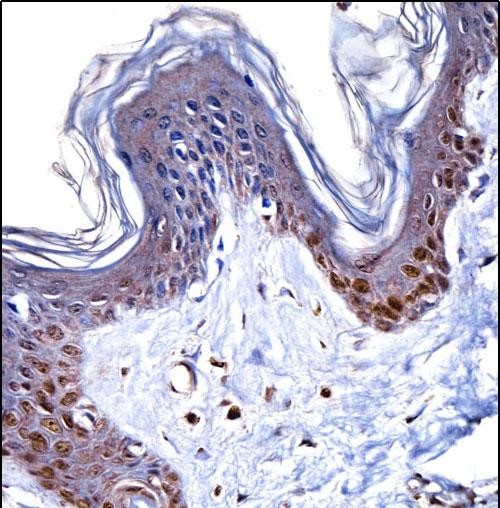


| WB | 咨询技术 | Human,Mouse,Rat |
| IF | 咨询技术 | Human,Mouse,Rat |
| IHC | 1/25-1/100 | Human,Mouse,Rat |
| ICC | 技术咨询 | Human,Mouse,Rat |
| FCM | 咨询技术 | Human,Mouse,Rat |
| Elisa | 1/1000-1/2000 | Human,Mouse,Rat |
| Aliases | Non-histone chromosomal protein HMG-14, High mobility group nucleosome-binding domain-containing protein 1, HMGN1, HMG14 |
| Entrez GeneID | 3150 |
| WB Predicted band size | 10.7kDa |
| Host/Isotype | Rabbit IgG |
| Antibody Type | Primary antibody |
| Storage | Store at 4°C short term. Aliquot and store at -20°C long term. Avoid freeze/thaw cycles. |
| Species Reactivity | Human |
| Immunogen | This HMGN1 antibody is generated from rabbits immunized with a KLH conjugated synthetic peptide between 1-30 amino acids from the N-terminal region of human HMGN1. |
| Formulation | Purified antibody in PBS with 0.05% sodium azide. |
+ +
以下是关于NRAS抗体的3篇代表性文献及其摘要概括:
1. **"Clinical relevance of KRAS and NRAS mutations in colorectal cancer"**
- **作者**: Andreyev HJ, et al.
- **摘要**: 该研究通过免疫组化(IHC)和测序技术分析了结直肠癌患者中KRAS和NRAS基因的突变状态,探讨了NRAS抗体在临床样本检测中的特异性和敏感性。结果显示,NRAS突变与患者对EGFR靶向治疗的耐药性相关,强调了使用特异性抗体进行突变筛查的临床价值。
2. **"Targeting NRAS mutations in melanoma through dual MEK and CDK4 inhibition"**
- **作者**: Kwong LN, et al.
- **摘要**: 研究利用NRAS特异性抗体及基因编辑技术,验证了NRAS突变在黑色素瘤中的促癌作用。实验表明,联合抑制MEK和CDK4可有效抑制NRAS突变肿瘤的生长,为基于抗体检测的个性化治疗策略提供了依据。
3. **"RAS oncogenes: weaving a tumorigenic web"**
- **作者**: Cox AD, et al.
- **摘要**: 这篇综述系统总结了RAS家族(包括NRAS)在癌症信号通路中的作用,重点讨论了针对NRAS突变蛋白的抗体开发进展及其在诊断(如Western blot和免疫荧光)中的应用,同时展望了靶向NRAS的治疗挑战。
4. **"Antibody-based detection of NRAS Q61R mutations in circulating tumor DNA"**
- **作者**: Huang A, et al.
- **摘要**: 研究开发了一种基于抗体夹心法的检测技术,用于识别血液中NRAS Q61R突变。该方法通过高亲和力抗体捕获突变蛋白,结合数字PCR技术,实现了无创、高灵敏度的癌症早期诊断,为NRAS突变患者的动态监测提供了新工具。
以上文献涵盖了NRAS抗体在突变检测、机制研究、治疗策略及技术开发中的应用,反映了其在基础研究与临床转化中的重要性。
**Background of NRAS Antibodies**
NRAS (Neuroblastoma RAS viral oncogene homolog) is a member of the RAS family of small GTPases, which regulate critical cellular processes, including proliferation, differentiation, and apoptosis, by cycling between active GTP-bound and inactive GDP-bound states. Mutations in the *NRAS* gene, particularly at codons 12. 13. or 61. result in constitutive activation of the protein, leading to hyperactivation of downstream pathways like MAPK/ERK and PI3K/AKT. These mutations are frequently implicated in cancers such as melanoma, colorectal carcinoma, and hematologic malignancies.
NRAS-specific antibodies are essential tools in biomedical research and diagnostics. They enable the detection and quantification of NRAS protein expression, post-translational modifications (e.g., GTP-binding status), and mutant variants in tissue samples or cell lysates. Such antibodies are widely used in techniques like Western blotting, immunohistochemistry (IHC), and immunofluorescence (IF) to study NRAS-driven oncogenic signaling and validate its role in tumorigenesis.
In clinical settings, NRAS antibodies may aid in identifying patients with NRAS-mutant cancers, guiding therapeutic decisions. While direct targeting of mutant NRAS remains challenging, these antibodies support research into combination therapies or inhibitors of downstream effectors. Additionally, they are critical in preclinical studies evaluating resistance mechanisms to targeted therapies.
Overall, NRAS antibodies serve as pivotal reagents for understanding RAS biology, advancing cancer diagnostics, and developing precision oncology strategies.
×